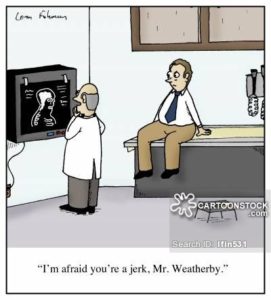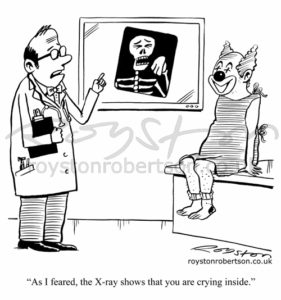What if X-rays could also show our emotions and thoughts?
We break a bone, bump our head, or have back trouble, and the doctor orders an x-ray. In some cases when answers can’t be found an MRI is also ordered. You have concerns about the possible side-effects, so you hesitate getting one.
Now suppose that the negative side-effects, healthwise, have been eliminated. This is due to a revolutionary new kind of x-ray that was developed. However, there is just one side-effect that has been introduced with this new technology. Not only will the X-ray/MRI take a picture of your bones for interpretation with no harm to your body, it will also show your thoughts and emotions both at the time of the x-ray and during the past 48 hours.
On the positive side, you will know whether or not you have broken something, which may be causing you pain or whether there is some sort of emotional (psychosomatic) piece that is causing your discomfort.
Then again, your doctor might discover some of your thoughts about their practice and other thoughts about people or events that you would prefer kept to yourself.
Would it make a difference if the emotion/thought scan was only an instantaneous picture of that particular second, or as I’ve described it, with a longer term picture of what’s going on in your body?
 What if the emotion/thoughts picture could only pick up the information from the part that is being x-rayed? That arm really wants to hit or hug someone. Dentists might appreciate knowing ahead of time that being bitten is in their future. And what about other areas of your body that you might not want others to know what’s being thought?
What if the emotion/thoughts picture could only pick up the information from the part that is being x-rayed? That arm really wants to hit or hug someone. Dentists might appreciate knowing ahead of time that being bitten is in their future. And what about other areas of your body that you might not want others to know what’s being thought?
Personally, it would be interesting to find out some of that information. I have this chronic shoulder pain that clearly most know what’s going on. X-rays showed nothing, neither did a cortisone injection nor limited physical therapy. I would like to know the shoulder’s thoughts. I already know my emotional reaction to the pain and maybe it would even help a doctor prescribe treatment that works. The same goes for the constant hissing in my ear (tinnitus) and periodic pain that I have experienced around my ear; a brain MRI, which I had for the pain, showed nothing (Even without the thought scan, I know what’s going through your mind right now…ha-ha). So why can’t my head/ear tell the ENT doctor what the problem is?
 Research shows that doing good things promote better health and physical well-being. Rather than guess work based on subjective studies, this device could give empirical data. I found this picture on the Internet. Clearly, some child is in the process of developing this technology.
Research shows that doing good things promote better health and physical well-being. Rather than guess work based on subjective studies, this device could give empirical data. I found this picture on the Internet. Clearly, some child is in the process of developing this technology.
Now What if these devices were inexpensive and you could wear them every day? Are they the next generation Fitbits or Apple Watches? Count me in.





What an interesting concept. I suppose you could go one step further and use it to detect dangerous people. I hope your shoulder improves. My daily discomforts are from arthritis. Old age. Tough to bear. Find me here. LINK
This would be helpful, I suppose. A little invasive, too. I’d have to feel comfortable with my doctor before I let him/her dig deeper. But, yes, if such a scan existed, it could go a long way in helping with mental health research.
Pingback: A to Z Blog Challenge Reflection 2017 | hdhstory.net